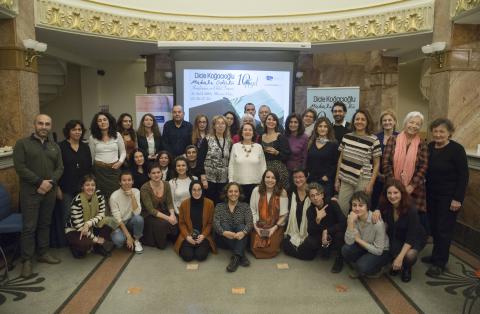Established by the Sabanci University Faculty of Arts and Social Sciences and Gender and Women’s Studies Center of Excellence (SU Gender), the 10TH Dicle Kogacioglu Article Awards were presented on the Ceremony and Conference in Minerva Palas, hosted on Saturday, December 21. In the 10th year of the award, Rabia Demirci, Deniz Nihan Aktan, Güley Bor, İpek Bozkurt and Gizem Sivri have been awarded for their articles.
Seda Kalem, from Istanbul Bilgi University, gave the opening speech. Among her remarks she said, “I was Dicle’s student first. Then a colleague and a friend. But I always remained as her student. I kept learning from her. It is academically very important that this award ceremony has been organized for 10 years now.”
Nurcan Ozkaplan, from Işık University, chaired the panel including presentations of the awarded articles. This year’s presented articles were; Deniz Nihan Aktan “Sexuality Politics on the Football Field”, Rabia Demirci "The Space Experience of Young Women Between Opportunity and Limitations: The Case of Kağıthane”, Güley Bor and İpek Bozkurt “In Defense of Ethics: A Feminist Critique of Defense Lawyers’ Advocacy in Violence Against Women Cases” ve Gizem Sivri “Women in the Prisons: Women's Criminality and Women's Imprisonment in the Ottoman Empire: 1840-1919.”
In the following session a short documentary, titled “About Dicle”, was shown. The documentary shared Dicle’s friends’ and family’s feelings and thoughts about Dicle Kogacioglu. From 2010 to date, the aim of the award has been to support gender-focused research on Turkey and to encourage young researchers. This year’s awarded articles are as follows:
First:
Rabia Demirci, "The Space Experience of Young Women Between Opportunity and Limitations: The Case of Kağıthane”
Second:
Deniz Nihan Aktan, “Sexuality Politics on the Football Field”
Third:
Güley Bor and İpek Bozkurt, “In Defense of Ethics: A Feminist Critique of Defense Lawyers’ Advocacy in Violence Against Women Cases”
Third:
Gizem Sivri, “Women in the Prisons: Women's Criminality and Women's Imprisonment in the Ottoman Empire: 1840-1919”.
